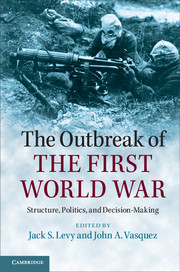Book contents
- Frontmatter
- Dedication
- Contents
- List of figures
- List of tables
- List of contributors
- Preface
- Part I Overview of debates about the causes of the First World War
- Part II Structure and agency
- 3 Strategic rivalries and complex causality in 1914
- 4 A “formidable factor in European politics”
- Part III The question of preventive war
- Part IV The role of the other powers
- References
- Index
- References
3 - Strategic rivalries and complex causality in 1914
Published online by Cambridge University Press: 05 July 2014
- Frontmatter
- Dedication
- Contents
- List of figures
- List of tables
- List of contributors
- Preface
- Part I Overview of debates about the causes of the First World War
- Part II Structure and agency
- 3 Strategic rivalries and complex causality in 1914
- 4 A “formidable factor in European politics”
- Part III The question of preventive war
- Part IV The role of the other powers
- References
- Index
- References
Summary
It sometimes seems as if explaining the outbreak of war in 1914 is a holy grail for international relations specialists in war etiology. The First World War, of course, was not a minor event in the annals of international history and that helps to explain some of its allure. Its reputation as the war no one wanted also makes it something of a magnet for scholarly entrepreneurs. Explaining the inexplicable is always a worthy challenge. Moreover, the developments that transpired prior to the outbreak of war are sufficiently complicated that almost every model ever created in international relations seems to fit. Yet underlying the whole explanatory edifice is the early and continuing search for blame, its evasion, and its former implications for postwar reparations and war guilt. Which country was most responsible for bringing about the onset of the First World War? In addition, a disproportional number of the central research foci in international relations – security dilemmas, spiral dynamics, offensive–defensive arguments, crisis dynamics, alliances, arms races – stem to varying extents from interpretations of the onset of the First World War. If we get the outbreak of this “wrong” or have overlooked significant factors, we may be heading in the wrong direction in our search for general explanations of war causes.
- Type
- Chapter
- Information
- The Outbreak of the First World WarStructure, Politics, and Decision-Making, pp. 65 - 86Publisher: Cambridge University PressPrint publication year: 2014
References
- 4
- Cited by



